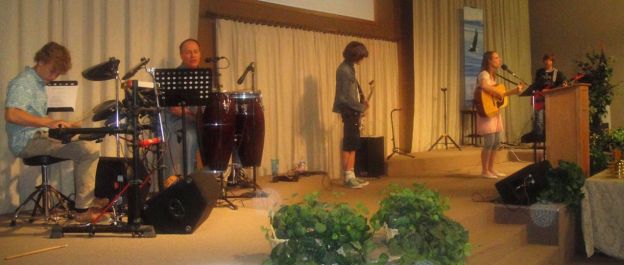The following is based on the introduction to Rory Noland’s Heart of the Artist. I prepared this as a five minute devotional for my worship team at Standing Stones Community Church in Phoenix, AZ, but I hope that others may find it beneficial, too.
But then, no artist is normal; if he were, he wouldn’t be an artist. Normal men don’t create works of art. They eat, sleep, hold down routine jobs, and die. You are hypersensitive to life and nature; that’s why you are able to interpret for the rest of us. But if you are not careful, that very hypersensitiveness will lead you to your destruction. The strain of it breaks every artist in time. Irving Stone, Lust for Life
Often, artistic types are looked at as moody, irresponsible and overly sensitive. We seem to think that the more eccentric an artist, the more of a genius he must be. Many churches struggle with the question of whether to have excellent musicians with questionable morals or mediocre musicians with Christ-like righteousness. Let’s commit to excelling musically and spiritually.
As motivation, consider the importance of the arts to God. (This list is not exhaustive!)
- Poetry: Job, Psalms, Proverbs, Ecclesiastes, Song of Solomon
- Visual Arts: Bezalel and Oholiab created beautiful works of art for the tabernacle. Solomon did the same for the temple (Exodus 31:2-6).
- Dance: Miriam, a prophetess and Moses’ sister, danced in praise after the miracle at the Red Sea (Exodus 15:20). David danced before the Lord (2 Samuel 6:14-15) and includes dancing in the Psalms (Psalm 150:4).
- Music: The Book of Psalms is a collection of music used in worship. Also, we have many examples of singers and instrumentalists using their gifts to praise God (1 Chronicles 15:16, 2 Chronicles 35:15, and Psalm 68:24-25, just to name a few)
- Drama and storytelling: Ezekiel the prophet used drama to communicate God’s message (Ezekiel 4-5). Jesus used the power of a story many times through His parables (Matthew 22:1-14, Luke 15:11-32, and many others).
Church music is not just a stepping stone for musicians wanting to get into the Christian music industry, complete with record deals and radio time; church music has significant eternal value in and of itself! Here are a few purposes of the arts in the church:
- Worship: As we sing “psalms, hymns, and spiritual songs” (Ephesians 5:19), we give glory and honor to the very One who saves our souls. What a privilege!
- Evangelism: An unbeliever who enters our worship can be edified by meaningful words used in services. (1 Corinthians 14:23-25) The arts can help break down barriers where mere words fall short, not in a manipulative way but in an authentic, holistic way.
- Encouragement: The Psalms address the many variety of needs among humanity. Whether we come in need of admonishing or comfort or whether we need to rejoice or mourn, we can and should do so in unity with those in the church.
- Celebration: Many times in the Old Testament, God calls His people to remember through celebration. Celebrations are perfect times to remember what God has done so that we don’t lose heart when trials come.
Application:
- Evaluate your motivation for being on the team. Do you recognize the importance of what you are doing? If not, ask God to give you His eyes. Search His Scriptures for truth.
- Do you see yourself as a victim of your artsy personality? Remember that God made you and can redeem every part of who you are for His kingdom if you let Him. For example, you can be sensitive with deep emotions without being controlled by your emotions.
- Are you as committed to growing spiritually as you are to growing musically? Look at how you spend your time outside of work and school. Is communing with God a daily, even hourly, part of that?

Pingback: Worship Team Devotional: “Proven Character,” from “Heart of the Artist” | Encouraging Indigenous Worship Forms
Pingback: Worship Team Devotional: “Servanthood Vs Stardom” from “Heart of the Artist” | Encouraging Indigenous Worship Forms